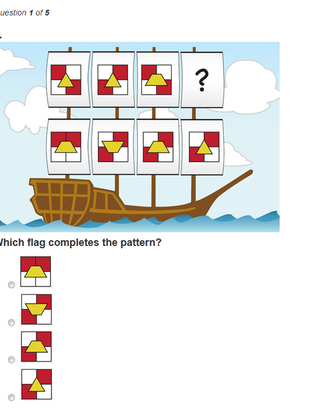
For New York City parents, getting a child into the Ivy League starts when little Kingston or Piper is still in the womb, if not earlier. And despite the fact that kids’ brains are pretty much Silly Putty for a few more birthdays, the first important test comes at 4 years old. In 2014, it should come as no surprise, this insane assessment will be administered on an iPad.
DNAinfo has the sordid details — and not-easy (!) sample questions from test-prep company Bright Kids NYC, excerpted above — of the ERBS’s (Educational Records Bureau) brand-new AABL (Admission Assessment for Beginning Learners), which will be offered this fall to future overachievers whose parents are interested in having them attend Horace Mann or the Riverdale Country School. Other top-tier learning institutions are expected to follow, ditching the IQ tests that have been standard for the last 45 years.
Try the test yourself, but be warned: Your results may embarrass you.
Not that any of the various exams tell us much, as Jennifer Senior wrote in “The Junior Meritocracy,” a 2010 New York story:
The fact is, 4 is far too young an age to reach any conclusions about the prospects of a child’s mind. Even administrators who use these exams—indeed, especially the administrators who use these exams—say they’re practically worthless as predictors of future intelligence. […] “Early good testers don’t make better students,” [says Steve Nelson, head of the famously progressive Calhoun School], “any more than early walkers make better runners.”
Put another way:
Most researchers in the field of childhood development agree that the minds of nursery-school children are far too raw to be judged. Sally Shaywitz, author of Overcoming Dyslexia, is in the midst of a decades-long study that examines reading development in children. She says she couldn’t even use the reading data she’d collected from first-graders for some of the longitudinal analyses. “It simply wasn’t stable,” she says. I tell her that most New York City schools don’t share this view. “A young brain is a moving target,” she replies. “It should not be treated as if it were fixed.”
On the plus side, the new test will be just $65, a break from the old rate near $600. Although the tutoring — yes, for a toddler — will still add up: DNAinfo reports that the test change came about in part because those in charge were “[concerned] that 4-year-olds were over-preparing for the old IQ exam.” And yet, one-on-one sessions to teach the new test are already running for between $140 and $200 each.
Horace Mann explained its decision to switch in a statement (emphasis ours):
Our School’s decision to require the AABL for admission ensures that every applicant for Kindergarten and First Grade at Horace Mann School has completed a standardized measure of reasoning and achievement that is psychometrically valid. While the score report is only one element of a child’s application, it is the only piece of the application that is consistent and objective for our applicants, who come from many schools and many different backgrounds and include children who do not come to us from formalized preschool settings.
The AAPL is supposed to be less subjective than the old IQ-based tests, and measures knowledge of shapes, patterns, numbers, and letters. Oh, and indirectly, their familiarity with iPads, which shouldn’t be a problem: “Kids know how to use the iPad. They like the iPad. It’s more engaging to them. It looks like a game,” an expert told DNAinfo. “But they still have to answer the questions correctly.”
What’s unlikely to change are the outrage and stress levels of parents, who are convinced their kids will be at a disadvantage based on shaky metrics. “How can you lock children into a specialized educational experience at so young an age?” as one professor studying children said to Senior. “As soon as you start denying kids early, you penalize them almost progressively. Education and mental achievement builds on itself. It’s cumulative.”





























